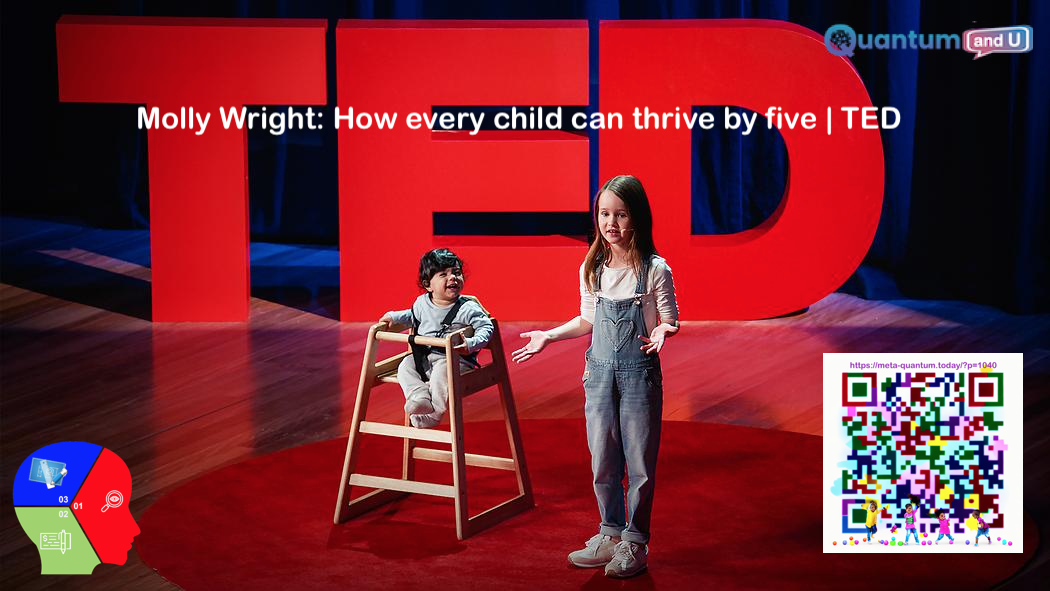
Introduction:
In Molly Wright’s TED talk, “How Every Child Can Thrive by Five,” she elucidates the audience on the pivotal role of basic interactions in the cognitive and emotional evolution of children throughout their lifetime. She explores the enduring influence of early relationships and communication on a child’s educational growth, well-being, and resilience. To exemplify this, she presents Ari, a perceptive toddler who epitomizes the learning capabilities of children from their surroundings, and Amarjot, a community figure who exemplifies the profound impact adults can have on children through cultivating meaningful bonds. Collectively, Ari and Amarjot strengthen Molly’s discourse on the crucial role of interpersonal connections in childhood development. She implores adults to recognize their influential capacity and ensure their interactions with children are as nurturing as possible. Molly’s talk illuminates that child development is a communal responsibility, urging all adults to acknowledge their potential to shape children’s futures by fostering enriching relationships in the present. Her talk underscores the importance of rudimentary interactions and meaningful bonds in childhood development, urging adults to comprehend their pivotal role in molding the forthcoming generation through these significant interactions.
Related Sections:
- The Power of Early Years: Molly emphasizes the significance of the first five years of a child’s life and highlights the crucial role they play in health, development, and brain growth. Ari’s journey from the womb to infancy showcases the remarkable changes that occur during this period.
- Brain Development: Using visual aids, Molly illustrates the rapid growth of a baby’s brain, emphasizing that the early years are a critical time for neural connections. She underscores that the brain develops faster during childhood than any other stage of life, forming the foundation for lifelong learning.
- Five Key Factors for Healthy Development: Molly introduces the top five factors that contribute to a child’s healthy development: connecting, talking, playing, a healthy home environment, and a supportive community. She explains how these elements collectively foster optimal brain development and enable children to reach their full potential.
- The Concept of “Serve and Return”: Molly introduces the concept of “serve and return,” which refers to engaging, talking, and playing with children. She emphasizes that these interactions not only build relationships and mental well-being but also impart vital life skills, such as communication, empathy, and problem-solving.
- Impact of Connection: Molly showcases how the absence of meaningful interaction affects a child’s emotional state, using Ari’s reaction when his father stops engaging with him as an example. She underscores that consistent connections are pivotal for a child’s emotional security and overall development.
Conclusion and Takeaway Key Points:
Molly concludes her talk by reiterating the transformative potential of simple interactions in a child’s early years. She encourages adults to remember that every moment spent with a child is an opportunity to connect, talk, and play. By practicing “serve and return” consistently, adults can contribute to a child’s confidence, curiosity, and capacity to navigate life’s challenges.
Takeaway Key Points:
- Early childhood (first five years) is a critical phase for brain development and lays the foundation for lifelong learning.
- Healthy brain development depends on factors like connecting, talking, playing, a nurturing home, and a supportive community.
- “Serve and return” interactions, involving engagement, talking, and playing, are essential for children’s emotional well-being and life skill development.
- Consistent connections with adults foster a child’s emotional security, confidence, and ability to explore the world.
- Meaningful interactions during early childhood have a lasting impact on a child’s future, from education to relationships.
Review Conclusion:
Molly Wright’s TED talk masterfully highlights the immense power of early interactions in shaping a child’s development. With an endearing delivery and compelling insights, she demonstrates that something as simple as peekaboo can indeed change the world. As viewers, we’re reminded of the profound impact we can have on the next generation’s well-being and potential by engaging, talking, and playing with them during their crucial first five years. The talk’s message resonates, urging us all to contribute to a brighter future for every child.


